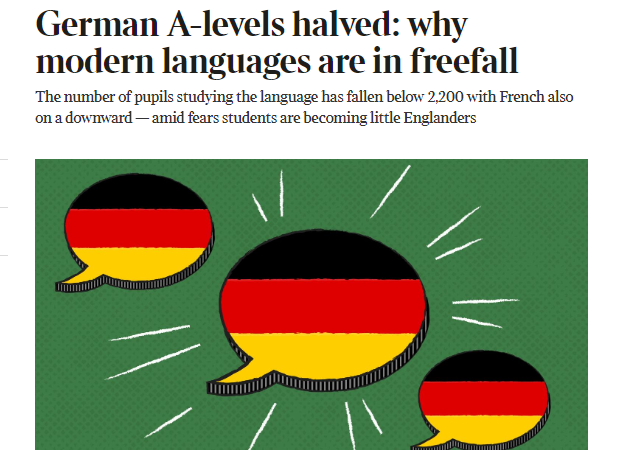“If it isn’t Brexit, then it must be the Tories? There are NO other options with which to blame anything on.”

On August 12, the Times published an article alluding to declining numbers of children in Britain learning a foreign language. The piece entitled: ‘German A levels halved: why modern languages are in freefall,’ looks at fears that students are becoming little Englanders, as the numbers of pupils studying German and French are in sharp decline.
The article includes a graph, which shows a drop in GCSE and A-Level exam entries for French and German since the Brexit referendum.
The report follows earlier findings by researcher Teresa Tinsley. Looking at the British Council’s 2018 Language Trends survey of schools in England, Tinsley points to how participation in languages fell significantly after the government stopped making languages compulsory at GCSE. By 2011, participation had declined to just 40 percent. The number had climbed back up to 49 percent in 2014, after the introduction of the English Baccalaureate, which measured schools on the proportion of pupils who took a combination of mathematics, English, sciences and humanities, including a modern or ancient language.
However, the 2018 figures showed that this proportion of 16-year-olds studying a language had dropped back to 47 percent.
As well as highlighting economic inequalities in access to language learning – fee-paying schools, for example, have a higher uptake of languages and offer a more diverse range of languages – the survey also found the Brexit has had an impact on language learning in schools in England. It found that, in 2018, two thirds of schools in the state sector, and 78 percent of fee-paying schools, employed teachers without UK citizenship who are citizens of other EU countries. Schools reported negative impacts on staffing, and fears about future recruitment and retention of language teachers.
But the most significant impact of Brexit reported by schools, wrote Tinsley, was in relation to attitudes towards language learning. Just over a third of state schools reported that leaving the EU is having a negative impact on student motivation and/or parental attitudes towards language learning.
Despite such research highlighting the negative impact Brexit has had on youngsters learning languages, the Brexit-backing right-wing Spectator attempted to argue that the country’s decline in children learning a foreign language likes German and French, has nothing to do with Brexit.
Author Fraser Nelson, the Spectator’s editor, spoke of Britain’s kids being more ‘globally-minded than any other generation, and this is reflective of a Britain that voted in 2016 not to move away from Europe but to strengthen ties with the wider world.’
The author went onto to say that the languages he tried to learn are of ‘little practical help now,’ and how Google Translate has ‘been revolutionary, opening up the foreign-language world at the touch of a button.’
Fraser’s argument that ‘Brexit is irrelevant’ to the big drop in language study among youngsters, didn’t go unnoticed on Twitter.
“Nothing more foolish than believing we can rely on machine translations to give us deep insight into non-English speaking countries. We can’t. We’ll just grow culturally and socially more isolated from them. We’ll be the losers individually and nationally,” wrote one reader.
“What a load of bollocks! Day one of doing a Modern Languages degree I was told how much Brexit had worsened the course,” wrote another.
Another posted: “If it isn’t Brexit, then it must be the Tories? There are NO other options with which to blame anything on.”
Gabrielle Pickard-Whitehead is a contributing editor to Left Foot Forward
Left Foot Forward doesn't have the backing of big business or billionaires. We rely on the kind and generous support of ordinary people like you.
You can support hard-hitting journalism that holds the right to account, provides a forum for debate among progressives, and covers the stories the rest of the media ignore. Donate today.



